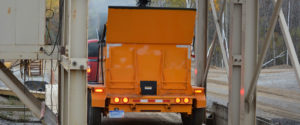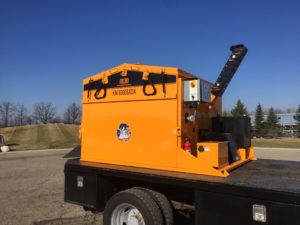5 Things to Consider When Buying an Asphalt Hotbox
When it comes to asphalt hotboxes there are several options on the market to choose from nowadays. Whether you already have a hotbox and are ready to upgrade or if you are looking to purchase an asphalt hotbox for the first-time, sorting through all the options and landing on an asphalt hotbox that will suit your company’s needs can get overwhelming. To help sort through the clutter and confusion, here are 5 factors to consider when buying an asphalt hotbox.
5 Things to Consider When Buying an Asphalt Hotbox
1. Choosing the right fuel source
Most hotbox manufacturers offer both diesel and propane burner systems, and each comes with their unique advantages. A propane burner system requires little to no maintenance and is a very easy to operate. A diesel burner system has a higher rated BTU heating system (105,000BTU vs 60,000BTU with propane). Diesel is also more readily available and convenient to acquire than propane. Most customers choose the diesel heating system because of the higher BTU efficiency and convenience but propane is an option for a no frills easy to operate system.

2. Size Options
Asphalt hotboxes come in two main sizes, 2 ton and 4-ton. When choosing a size, you need to consider what exactly you will be using the hotbox for and keep in mind your company’s capabilities. Usually 2 tons will be adequate if you are doing infrared repairs or small sized jobs. If you plan on doing skin patching, saw cut repairs, utility cut repairs, or any other medium to large sized jobs then a 4 ton would be more suited to fulfill your needs. If you are split on what size will fit your company always remember you can put 2 ton in a 4 ton, but you can’t put 4 ton in a 2 ton.
3. Air Jacketed vs Oil Jacketed Asphalt Hotbox
Most asphalt hotboxes are standard air jacketed design, meaning they have 2 or 3 layers of high temp insulation that maintains the heat inside the hotbox hopper. Some manufacturers offer an “oil jacketed” option where there is a layer of oil in lieu of high temp insulation that acts as the insulator. Oil Jacketed insulation has a couple of drawbacks, first being the additional upfront and maintenance costs. Oil jacketed units also add additional weight to the units cutting away at the trailer GVWR. Oil jacketed design has no advantages over a manufacturers standard air jacketed design.
4. Buying Used vs New
Every once in a while a used hotbox will show up on an auction site or used equipment site for what seems like a great deal. As with any used equipment buyer beware! If the unit is local take the time to go physically inspect the condition and functionality. If it is not local get the make, model, and year and call the manufacturer to get an MSRP and see how that compares to what the seller’s price is. Asphalt guys are typically hard on equipment so take that under careful consideration when buying used.
5. Trailer vs Skid Mounted Hotbox
Asphalt hotbox trailers have become the preferred option over skid mounted units, more specifically hotbox trailers with the dump feature. Although skid mounted asphalt hotboxes are still very useful for small to medium size jobs including doing infrared repairs, a trailer offers some additional versatility over a skid mounted unit. It is important to know exactly what you plan on using the asphalt hotbox for and deciding what will make the most sense for your business.

One additional thing to keep in mind when buying an asphalt hotbox is WHO you buy the machine from. This goes for any equipment purchase but always deal with a company that has a dedicated team for after sales and support. Most manufacturers have a dedicated in-house team but if you have the option work with a local distributor or dealer this will be your best option for getting customized onsite training, and service.
It is always important to remember that every business is different, and you should purchase a hotbox that will fit your specific business needs. Weight the pros and cons of different options and make a decision that will best help you achieve your business goals.

